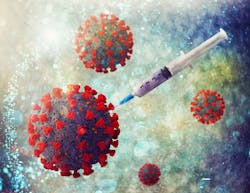The U.S. Food and Drug Administration amended the emergency use authorizations (EUAs) of the Moderna COVID-19 Vaccine and the Pfizer-BioNTech COVID-19 Vaccine to authorize bivalent formulations of the vaccines for use as a single booster dose at least two months following primary or booster vaccination. The bivalent vaccines, which are also referred to as “updated boosters,” contain two messenger RNA (mRNA) components of SARS-CoV-2 virus, one of the original strain of SARS-CoV-2 and the other one in common between the BA.4 and BA.5 lineages of the omicron variant of SARS-CoV-2.
The Moderna COVID-19 Vaccine, Bivalent, is authorized for use as a single booster dose in individuals 18 years of age and older. The Pfizer-BioNTech COVID-19 Vaccine, Bivalent, is authorized for use as a single booster dose in individuals 12 years of age and older.
The monovalent COVID-19 vaccines that are authorized or approved by the FDA and have been administered to millions of people in the United States since December 2020 contain a component from the original strain of SARS-CoV-2.
What you need to know:
The authorized bivalent COVID-19 vaccines, or updated boosters, include an mRNA component of the original strain to provide an immune response that is broadly protective against COVID-19 and an mRNA component in common between the omicron variant BA.4 and BA.5 lineages to provide better protection against COVID-19 caused by the omicron variant.
The BA.4 and BA.5 lineages of the omicron variant are currently causing most cases of COVID-19 in the U.S. and are predicted to circulate this fall and winter. In June, the agency’s Vaccines and Related Biological Products Advisory Committee voted overwhelmingly to include an omicron component in COVID-19 booster vaccines.
For each bivalent COVID-19 vaccine, the FDA based its decision on the totality of available evidence, including extensive safety and effectiveness data for each of the monovalent mRNA COVID-19 vaccines, safety and immunogenicity data obtained from a clinical study of a bivalent COVID-19 vaccine that contained mRNA from omicron variant BA.1 lineage that is similar to each of the vaccines being authorized, and nonclinical data obtained using a bivalent COVID-19 vaccine that contained mRNA of the original strain and mRNA in common between the BA.4 and BA.5 lineages of the omicron variant.
Based on the data supporting each of these authorizations, the bivalent COVID-19 vaccines are expected to provide increased protection against the currently circulating omicron variant. Individuals who receive a bivalent COVID-19 vaccine may experience side effects commonly reported by individuals who receive authorized or approved monovalent mRNA COVID-19 vaccines.
With today’s authorization, the monovalent mRNA COVID-19 vaccines are not authorized as booster doses for individuals 12 years of age and older.
The agency will work quickly to evaluate future data and submissions to support authorization of bivalent COVID-19 boosters for additional age groups as we receive them.
Who is eligible to receive a single booster dose and when:
Individuals 18 years of age and older are eligible for a single booster dose of the Moderna COVID-19 Vaccine, Bivalent if it has been at least two months since they have completed primary vaccination or have received the most recent booster dose with any authorized or approved monovalent COVID-19 vaccine.
Individuals 12 years of age and older are eligible for a single booster dose of the Pfizer-BioNTech COVID-19 Vaccine, Bivalent if it has been at least two months since they have completed primary vaccination or have received the most recent booster dose with any authorized or approved monovalent COVID-19 vaccine.

